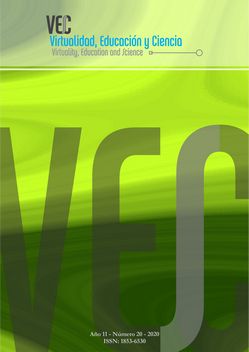Diez preguntas frecuentes (y urgentes) sobre pensamiento computacional
DOI:
https://doi.org/10.60020/1853-6530.v11.n20.27453Palabras clave:
pensamiento computacional; ciencias de la computación en la escuela; robótica escolar; transversalidadResumen
En este artículo abordamos algunas preguntas frecuentes relacionadas con el pensamiento computacional y las ciencias de la computación en la escuela desde una perspectiva que busca indagar detrás de las modas que imperan en lo respectivo a los usos de la tecnología en el ámbito escolar. En este sentido, se vuelve necesario involucrarnos en otras discusiones conexas, como la de la robótica escolar o la enseñanza transversal de la disciplina Informática. Se titula "urgente" porque cierta claridad epistemológica es precisa para acompañar los procesos de inserción de estos conceptos en las escuelas argentinas.
Referencias
AHO, A. V. (2012). Computation and computational thinking. The Computer Journal, 55(7), 832-835.
BENITTI, F. B. V. (2012). Exploring the educational potential of robotics in schools: A systematic review. Computers & Education, 58(3), 978-988.
BOYCE, A. K., CAMPBELL, A., PICKFORD, S., CULLER, D., & BARNES, T. (2011, JUNE). Experimental evaluation of BeadLoom game: how adding game elements to an educational tool improves motivation and learning. In Proceedings of the 16th annual joint conference on Innovation and technology in computer science education, 243-247. ACM.
CLEMENTS, D. H., & GULLO, D. F. (1984). Effects of computer programming on young children's cognition. Journal of Educational psychology, 76(6), 1051.
DENNING, P. J. (2017). Remaining trouble spots with computational thinking. Communications of the ACM, 60(6), 33-39.
DORAN, K., BOYCE, A., FINKELSTEIN, S., & BARNES, T. (2012, JULY). Outreach for improved student performance: a game design and development curriculum. In Proceedings of the 17th ACM annual conference on Innovation and technology in computer science education, 209-214. ACM.
GUZDIAL, M., (2011). A Definition of Computational Thinking from Jeannette Wing. In Computing Education Blog, Atlanta.
K-12 Computer Science Framework (2016). Technical Report. ACM, New York, NY, USA.
KAZAKOFF, E. R., SULLIVAN, A., & BERS, M. U. (2013). The effect of a classroom-based intensive robotics and programming workshop on sequencing ability in early childhood. Early Childhood Education Journal, 41(4), 245-255.
KAZIMOGLU, C., KIERNAN, M., BACON, L., & MACKINNON, L. (2011). Understanding computational thinking before programming: developing guidelines for the design of games to learn introductory programming through game-play. International Journal of Game-Based Learning (IJGBL), 1(3), 30-52.
KYSILKA, M. L. (1998). Understanding integrated curriculum. Curriculum journal, 9(2), 197-209.
MARTINEZ, C., GOMEZ, M. J., & BENOTTI, L. (2015, June). A comparison of preschool and elementary school children learning computer science concepts through a multilanguage robot programming platform. In Proceedings of the 2015 ACM Conference on Innovation and Technology in Computer Science Education, 159-164.
ACM.
NARDELLI, E. (2019). Do we really need computational thinking? Communications of the ACM, 62(2), 32-35.
NATIONAL RESEARCH COUNCIL (2010). Report of a workshop on the scope and nature of computational thinking. National Academies Press.
SELBY, C. C. (2015, November). Relationships: computational thinking, pedagogy of programming, and Bloom's Taxonomy. In Proceedings of the workshop in primary and secondary computing education, 80-87. ACM.
SCHERER, R., SIDDIQ, F., & SÁNCHEZ VIVEROS, B. (2018). The cognitive benefits of learning computer programming: A meta-analysis of transfer effects. Journal of Educational Psychology.
UNESCO/IFIP TC3 MEETING AT OCCE. Coding, Programming and the Changing Curriculum for Computing in Schools Report – Date of report: 4 February 2019.
WING, J., (2006). Computational thinking. Commun. ACM 49, 3 (March 2006), 33-35.
Descargas
Publicado
Número
Sección
Licencia
Se permite la generación de obras derivadas siempre que no se haga con fines comerciales. Tampoco se puede utilizar la obra original con fines comerciales.


